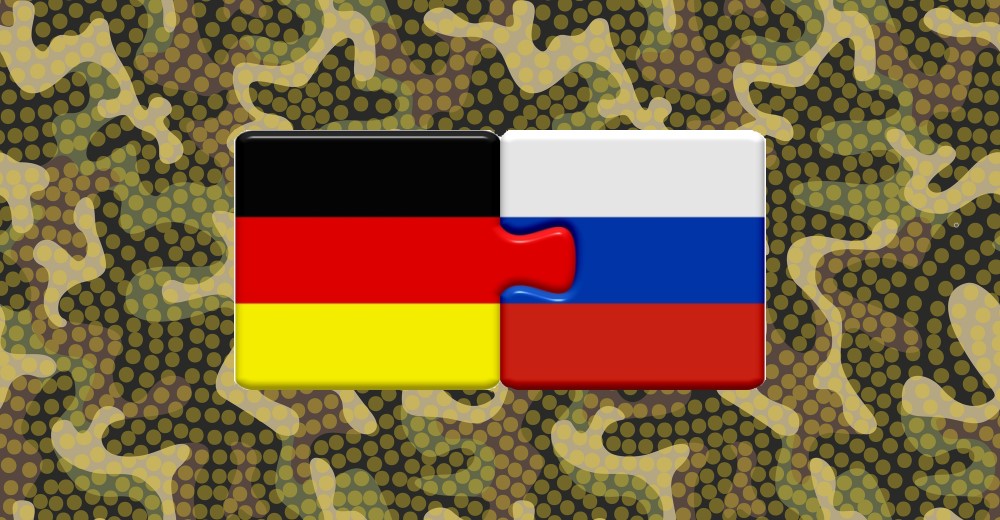New information obtained by another German newspaper, Welt am Sonntag, uncovers surprisingly large-scale German exports of so-called dual-use products (of both military and civilian use) to Russia despite EU sanctions, facilitating Russian militarism and aggression against the peoples of Ukraine, Chechnya, Georgia, Moldova, Syria, and other countries.
German companies continued supplying large volumes of the so-called dual-use goods to Russian Federation even after Russia's annexation of Crimea in 2014, according to the newspaper Welt am Sonntag. The newspaper's article published on 13 February stated that, referring to a previously not publicly known list by Germany's Federal Ministry of Economic Affairs obtained by Welt am Sonntag.
The non-public document shows that in 2020, the Ministry or rather its subordinate Federal Office for Economic Affairs and Export Control (BAFA) granted 673 licenses allowing exports of dual-use products to the destination country Russia.
"Total value: almost 366 million euros," Welt am Sonntag adds.
Dual-use products are goods that can be used for both civil and military purposes. These include sensors, lasers, high-end electronics, machinery that can be used in weapon production, technologies applicable for aircraft construction, certain chemicals.
The newspaper finds the large volume of dual-use goods from Germany "surprising" because, after Russia's annexation of Crimea in 2014, the European Union subjected such exports to Russia to much stricter criteria than to other countries.
"Therefore, the question arises whether the German approval authorities are examining here thoroughly enough," Welt am Sonntag says.
In 2020, Russia was the fourth largest importer of such goods from Germany, after China with €1.6 billion, the United States with a billion euros, and Brazil with €371 million.
Russia outranked Germany's neighboring France in terms of German dual-use goods imports, with Russia's purchases worth €366 million against France's €274 million in 2020.
"Ukraine, on the other hand, receives only a small number of dual-use supplies from Germany. In 2020, their value was only 17 million euros," according to the publication.
- Read also: Germany blocks Ukraine’s arms purchase from NATO as unofficial arms embargo on Ukraine continues
Almost nothing is known about what kind of products Russia receives. However, in recent years there has been debate underway regarding supplies of depleted uranium from Germany, which, experts believe, Russia could use in the production of high-tech weapons, such armor-penetrating bullets and mortar shells, armor for tanks and in military aircraft designs.
Moreover, Welt am Sonntag says, referring to the Federal Government's own list for the year 2020, in the case of Russia, unlike the other large recipient countries,
"there were 130 additional permits for other so-called unlisted dual-use goods 'and for goods under embargo regulations.' This was about exports with a hefty value of another good 660 million euros."
The German government last defended the approval of dual-use exports to Russia in March 2021, arguing that "concrete indications that there is a risk of military end-use" are needed before an export license to Russia could be denied.
- Read also: Nazi dreams of an enslaved Ukraine: the blind spot of Germany’s historical memory – Timothy Snyder
Bundestag MP Stefan Wenzel (the Greens) urged the authorities to take a closer look,
"Especially in the current tense situation with Russia, we have to enforce a restrictive export control policy. BAFA has to monitor very closely what is happening with dual-use goods and be able to rule out military use."
In recent years, according to Deutsche Welle, several criminal cases were opened in Germany in connection to the violation of EU restrictions on the export of dual-use goods and technologies to Russia. In those cases, exporters mentioned purely civilian companies as buyers in accompanying documents in order to mislead German customs officers. In particular, it was about supplying special metalworking machines suitable for the production of rocket hardware.
Read More:
- German security assistance to Ukraine perpetually on hold
- Why does Germany refuse to export arms to Ukraine?
- “Germany bears a special responsibility for European security”: Ukrainian Jews appeal to Chancellor Olaf Scholz
- 73 East Europe experts call on Germany to “fundamentally correct” Russia policy
- Germany blocks Ukraine’s arms purchase from NATO as unofficial arms embargo on Ukraine continues
- How German companies violated sanctions to bring Dutch sea platform to luxury marina in Crimea
- “A second Budapest memorandum”: experts on the US-Germany Nord Stream 2 deal
- From information laundering to influence: Russia’s footprints in Germany
- Germany strengthens Russia’s insolence with new economic agreement
- Putin regime has set up not one but five ‘fifth columns’ in Germany, Eidman says
- Putin actively using Cold War Stasi agent network in Germany, Reitschuster says
- Crimean factory gets generators from German company in breach of EU sanctions – media
- Germany, Norway deliver ilmenite ore to occupied Crimea in sanctions breach
- Nazi dreams of an enslaved Ukraine: the blind spot of Germany’s historical memory – Timothy Snyder

